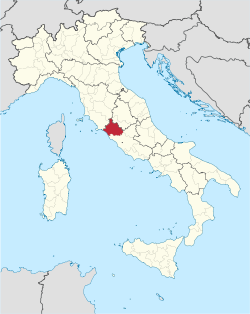Province of Viterbo
The Province of Viterbo (Italian: Provincia di Viterbo) is a province in the Lazio region of Central Italy. Its capital is the city of Viterbo.
Province of Viterbo | |
|---|---|
 Viterbo, the Palace of the Popes. | |
 Map with the province of Viterbo, in red, in Italy | |
| Coordinates: 42°25′7″N 12°6′15″E / 42.41861°N 12.10417°E | |
| Country | |
| Region | Lazio |
| Capital | Viterbo |
| Comuni | 60 |
| Government | |
| • President | Mauro Mazzola[1] |
| Area | |
| • Total | 3,615.24 km2 (1,395.85 sq mi) |
| Population (January 2017)[3] | |
| • Total | 319,008 |
| • Density | 88/km2 (230/sq mi) |
| Time zone | UTC+1 (CET) |
| • Summer (DST) | UTC+2 (CEST) |
| Postal code | 01100, 010xx |
| Telephone prefix | 0761, 0763, 0766, 06 |
| Vehicle registration | VT |
| ISTAT | 056 |
| Website | Official website |
The province is also called Tuscia.
History
changeThe province of Viterbo was created in January of 1927 with part of the old Province of Rome. In March of the same, the comune of Monte Romano.
In 1928, five comuni were added: Montalto di Castro, Monterosi, Nepi, Oriolo Romano and Tarquinia.
Geography
changeThe province of Viterbo has an area of 3,615.24 km2 (1,395.85 sq mi),[2] making it the second largest province of the Lazio region.
The province is bordered to the northwest with Tuscany (Grosseto and Siena provinces), to the northeast with Umbria (Terni province), to the east with the Rieti province and to the south with Rome. The Tyrrhenian Sea is to the west.
The province is in the northwest of the Lazio region. Most of the territory of the province is flat or with small hills. The highest mountain in the province is Monte Cimino (42°24′28″N 12°12′4″E / 42.40778°N 12.20111°E), in the southern part of the province, with an altitude of 1,053 m (3,455 ft).[4]
The main river in the province is the Tiber that forms the border between the Umbria (province of Terni) and Lazio (province of Viterbo) regions.
There are several lakes; the largest is the Bolsena lake with an area of 113.5 km2 (43.8 sq mi).
Administration
changeThe following shows the comuni of the province with more of 9,000 people living in them (1 January 2017).[3]
| No. | ISTAT Code |
Comune | Population (2017) |
|---|---|---|---|
| 1 | 056059 | Viterbo | 67,488 |
| 2 | 056021 | Civita Castellana | 16,418 |
| 3 | 056050 | Tarquinia | 16,383 |
| 4 | 056057 | Vetralla | 14,031 |
| 5 | 056036 | Montefiascone | 13,454 |
| 6 | 056039 | Nepi | 9,620 |
The largest comune is Viterbo, with 406.23 km2 (156.85 sq mi) and the two smallest are Calcata (7.63 km2 [2.95 sq mi] ) and Villa San Giovanni in Tuscia (5.28 km2 [2.04 sq mi] ).[5] The comune with fewest people living in it is Tessennano with 339 inhabitants.
Population
changeIn 2017, there are 319,008 persons living in the province,[3] for a population density of 88.2 inhabitants/km².
Evolution of the population in the Viterbo province

Related pages
changeGallery
changeReferences
change- ↑ "Presidente della Provincia" (in Italian). La Provincia di Viterbo on-line. Archived from the original on 19 July 2019. Retrieved 23 February 2017.
- ↑ 2.0 2.1 "Provincia di Viterbo" (in Italian). Tuttitalia.it. Retrieved 23 February 2017.
- ↑ 3.0 3.1 3.2 "Statistiche demografiche ISTAT" (in Italian). Demo.istat.it. Archived from the original on 3 January 2018. Retrieved 10 September 2017.
- ↑ "Monte Cimino, Italy". Peakbagger.com. Retrieved 24 February 2017.
- ↑ "Comuni in provincia di Viterbo per superficie" (in Italian). Tuttitalia.it. Retrieved 24 February 2017.
Other websites
change- Official Site Archived 2017-02-21 at the Wayback Machine (in Italian)
